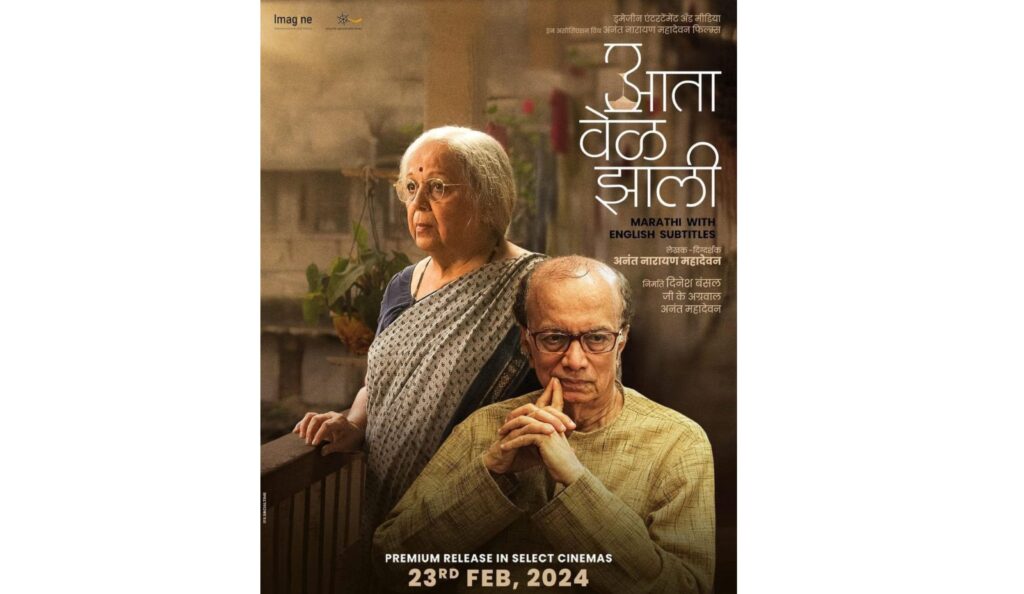Sanjay Leela Bhansali’s Guzaarish advocated the idea of euthanasia on a patient who was completely bed-ridden and in a vegetative state from below his head. But filmmaker Ananth Narayan Mahadevan’s Aata Vel Zaali (English title: It’s Time To Go) shows two protagonists wanting to end their lives through active euthanasia despite not suffering from any major illness.
The movie starts off in 2018. A senior citizen couple Shashidhar Lele (Dilip Prabhavalkar) and Ranjana Lele (Rohini Hattangadi) lives alone peacefully in a middle-class household in Mumbai. They would appear content with life to anyone. However, they have a desire of ending their lives through active euthanasia despite being fit. They feel they have carried out all their life’s responsibilities and have nothing more to offer in terms of productivity. Hence, they wish to end their respective lives while being in a happy and peaceful state.
Mr and Mrs Lele are considered weird by their extended family members and neighbours but that is not going to deter them. They write to the President of India about their wish and try other means as well but to no avail. But they are not ready to give up.
The biggest challenge for Aata Vel Zaali was to make the audience take Mr and Mrs Lele’s wish seriously and the film achieves that convincingly. You might not agree with Shashidhar and Ranjana’s desire of ending their lives this way but the reasons given by them appear sensible and convincing. In fact, some examples presented are even praiseworthy. For example, Mr Lele once quoting a philosopher saying that if you want a happy ending to your story, you must know where to end it.
The idea about an old couple wanting to end their lives brings back memories of Mahesh Bhatt’s classic Saaransh (1984). However, in that movie, the couple decides to end their life out of depression born out of the grief of their young son’s untimely death. But Mr and Mrs Lele are far from depressed. Interestingly, the 1984 movie also featured Hattangadi as the wife, although in a completely different character.
Despite the film speaking about death throughout its duration, it never gets sad. On the contrary, Aata Vel Zaali also qualifies as a light-hearted drama with a number of dialogues by Mahendra Patil that either make you laugh or smile. The picturization (cinematography by Pradip S Kanvildkar) also plays an important part here. The entire film is visually rich even if it shows ordinary, everyday visuals. This was also the case with Mahadevan’s earlier Hindi movie Gaur Hari Dastaan.
There was huge responsibility on Dilip Prabhavalkar and Rohini Hattangadi’s shoulders. It was their performance that was largely going to be responsible for making the audience understand and agree to their unusual demand. To say that they succeeded in their task would be an understatement. The two veterans add plenty of life to a film about death. Their unusual chemistry is felt right from the first scene. The rest of the actors like Jaywant Wadkar, Smita Tambe, Bharat Dabholkar and others offer good support in a limited screen time.
After so many plusses, you expect a bit more from the final scene than what is offered. Nevertheless, the climax isn’t disappointing.
Overall: Aata Vel Zaali is a smooth-flowing feel good film despite the topic it deals with.
Rating: 4 out of 5
Director: Ananth Mahadevan Narayan
Producers: Dinesh Bansal, G K Agrawal and Ananth Narayan Mahadevan
Writers: Ananth Mahadevan Narayan and Mahendra Patil
Cast: Dilip Prabhavalkar and Rohini Hattangadi
Also Read: Amaltash (Marathi movie) Review: Tenderly created saga on love, life & music

Leave a Reply